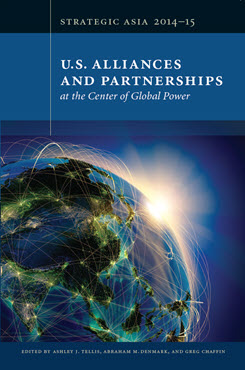Building U.S. Partnerships for the 21st Century
The Case of (and for) India
This chapter from Strategic Asia 2014–15 assesses the prospects for U.S. collaboration with India on Asian security and considers how Washington and New Delhi can work together more systematically on a range of common strategic challenges.
EXECUTIVE SUMMARY
This chapter assesses the prospects for U.S. collaboration with India on Asian security and considers how Washington and New Delhi can work together more systematically on a range of common strategic challenges.
MAIN ARGUMENT
As uncontested U.S. primacy in Asia gives way to intensified geopolitical competition with China, Washington has a grand strategic interest in the development of friendly centers of power in the Indo-Pacific capable of sustaining a non-Sinocentric order. Since 2005, the U.S. has pursued a conscious policy to facilitate the rise of India as a strategic actor in order to reinforce a set of core U.S. interests that India also shares. The Indo-U.S. partnership is a strategic stabilizer in a region riven by dynamic power shifts, arms racing, and territorial conflict and could recast the global balance of power and values in ways that make these two countries, rather than China alone, the pacesetters of the 21st century. U.S. leadership in the Indo-Pacific is thus more likely to endure through cooperation with a rising India that broadly supports American regional interests—because they mirror India’s own strategic priorities—than if the U.S. and India go their separate ways.
POLICY IMPLICATIONS
- The U.S. and India share a compelling interest in defeating terrorism, shaping an Asian security environment that is pluralistic rather than Sinocentric, and sustaining a liberal international economic order.
- From a U.S. perspective, India will be a stronger anchor of the Asian balance of power, and a better partner, if its development drive and military modernization are successful.
- Washington and New Delhi should focus their cooperation on the following: (1) defense supply, military training, and joint operations, (2) intelligence sharing and counterterrorism, (3) trilateral partnerships with like-minded countries, particularly Japan, (4) energy partnerships, (5) the deepening of trade and investment ties, and (6) the promotion of good governance abroad.
Strategic Asia
The Strategic Asia annual edited volume incorporates assessments of economic, political, and military trends and focuses on the strategies that drive policy in the region. Learn more about Strategic Asia.


